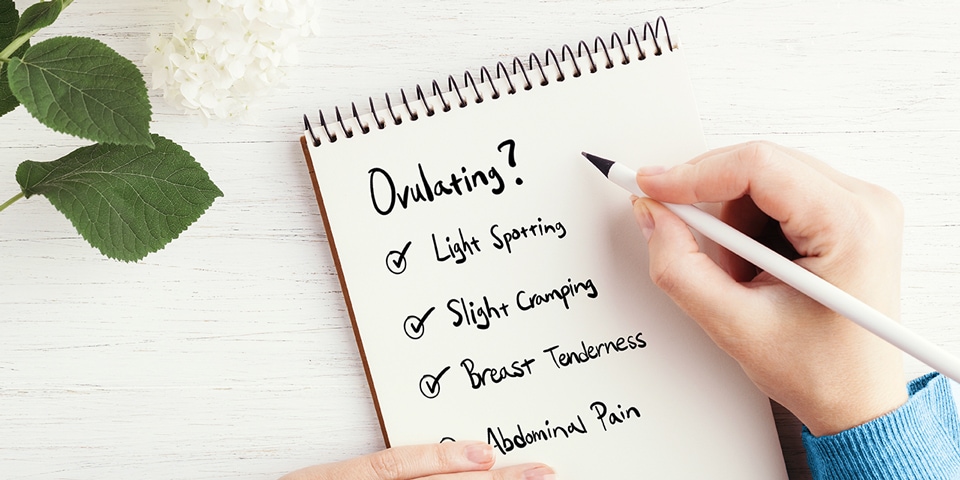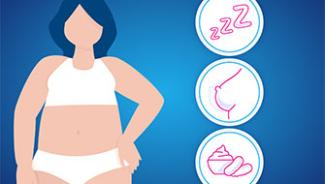Five questions about ovulation and health (that aren’t just about fertility)

When you hear the word “ovulation,” your mind may immediately jump to the topic of fertility. But even if you’re not trying to conceive, knowing about ovulation — and how it affects your body — is important to your overall health.
Here, we answer five questions you may have about ovulation that aren’t about trying to have a baby.
1. Why should I track ovulation if I’m not trying to get pregnant?
Monitoring your menstrual cycle and when you ovulate can help you prepare for possible ovulation symptoms and potentially help you avoid getting pregnant.
Ovulation symptoms can include light spotting or slight cramping (either a dull pain or a sudden twinge in your abdomen).1 If you know ovulation is around the corner, you can better plan around it to feel as comfortable as possible.
If you’re trying to avoid pregnancy, knowing when you’re going to ovulate can help you avoid intercourse during your fertile window. You need this information to practice a form of natural family planning called fertility awareness, and your doctor can advise you on whether it might be a good option or backup for you. If you do have sex during your fertile window and don’t want to get pregnant, you should use another form of birth control such as a condom.
2. How do I know when I’m ovulating?
Besides using a calendar or waiting for symptoms to strike, you can watch out for signs of ovulation including:
- Your cervical fluid, a form of vaginal discharge, becomes clear and stretchy.
- After ovulation, your basal body temperature increases. (To track this sign, you can either use a digital oral thermometer or one specifically designed for basal body temperature.)2
An ovulation test can help you detect the rise in fertility hormones just before an egg is released. Clearblue® offers several different ovulation tests to detect either just the luteinizing hormone (LH) surge or both the LH surge and estrogen. Using an ovulation test is a great way to know when you’re ovulating.
3. Why do my breasts hurt during ovulation?
As you get closer to ovulation, your body produces more estrogen to prepare for the possibility of an egg being fertilized. And additional estrogen in your body plus other hormone variations in your cycle can be the cause of breast swelling and tenderness that syncs up with phases of your menstrual cycle.3
The medical term for breast pain with these symptoms is mastalgia, and it’s surprisingly common — roughly two-thirds of women experience it sometime between puberty and menopause.3 Cyclic breast pain is often associated with the luteal phase (which starts immediately after ovulation and lasts until the start of your next period) and will usually subside on its own, decreasing on or after the start of your period.3 Estrogen and other hormones fluctuate during the luteal phase, so breast pain associated with your cycle may fluctuate as well. If you experience breast pain that doesn’t subside on its own, or if you have any other concerns, speak to your doctor.
Additionally, consider trying these self-care suggestions:
- Applying a hot or cold compress to the affected area.
- Wearing a properly fitting bra (and a sports bra during workouts).
- Speak to your doctor to discuss if taking over-the-counter pain relievers could be an option for you.4
4. What is ovulation pain (mittelschmerz pain)?
Feeling pain in your lower abdomen? It could be mittelschmerz.
Mittelschmerz (German for “middle pain”) is lower abdominal pain that’s associated with ovulation.5 Usually, the pain occurs on the side of the ovary releasing an egg — and about 14 days before your next menstrual period.5 The pain can mimic menstrual cramps — a dull ache in your abdomen — or feel like more of a sudden twinge.5 More than 40% of women of reproductive age may experience mittelschmerz.6
In most cases, mittelschmerz does not require medical intervention.5 To soothe minor discomfort, talk to your doctor about taking over-the-counter pain relievers (but first discuss with them whether pain relievers are a good option for you, how much to take and for how long) and focus on your self-care routine. If the pain is affecting your daily life, contact your doctor.
5. I have no signs of ovulation. Am I pregnant?
First things first: if you think you may be pregnant, consider taking a pregnancy test.
That said, a lack of ovulation symptoms isn’t generally considered one of the signs of early pregnancy. While the ovulation symptoms we’ve talked about are commonly reported, that doesn’t mean you’ll experience them. And if you do experience some symptoms regularly, their intensity may naturally vary.
So even if you happen to have fewer or no signs of ovulation when you’d normally expect to see them, it’s not a clear indicator of pregnancy. The best way to know if you’re pregnant is to take a test.
To recap: understanding ovulation isn’t just about trying to have a baby. Knowing how this part of your cycle affects your body can help you treat symptoms, advocate for your health and more. If you have more questions or aren’t sure about what you’re experiencing, get in touch with your doctor.
Sources and Disclaimers
- National Health Service. “Ovulation pain.” Accessed 19 Oct. 2022. https://www.nhs.uk/conditions/ovulation-pain/
- Mayo Clinic. “What ovulation signs can I look out for if I’m trying to conceive?” Accessed 19 Oct. 2022. https://www.mayoclinic.org/healthy-lifestyle/getting-pregnant/expert-answers/ovulation-signs/faq-20058000
- Muhammad T. Tahir, Shafeek Shamsudeen. “Mastalgia” National Library of Medicine. 2021. Accessed 29 Sept. 2022. https://www.ncbi.nlm.nih.gov/books/NBK562195
- Dana Sparks. “Home Remedies: Tending to breast tenderness” Mayo Clinic News Network. 2017. Accessed 29 Sept. 2022. https://newsnetwork.mayoclinic.org/discussion/home-remedies-tending-to-breast-tenderness/
- Mayo Clinic. “Mittelschmerz” Accessed 29 Sept. 2022. https://www.mayoclinic.org/diseases-conditions/mittelschmerz/symptoms-causes/syc-20375122
- Nathan R. Brott, Jacqueline K. Le. “Mittelschmerz.” National Library of Medicine. 2022. Accessed 29 Sept. 2022. https://www.ncbi.nlm.nih.gov/books/NBK549822/

What are the early signs of pregnancy?
There are various symptoms that can indicate you might be pregnant, even if you might not experience any/all of them.

